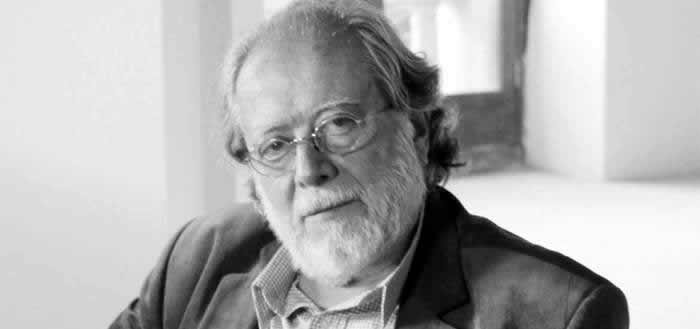Iván Égüez (Quito , 1944) is an Ecuadorian novelist, short story writer, and poet. He has written 7 novels, 7 short story books, and 6 poetry books. His novel “La Linares” was the first recipient of the prestigious Aurelio Espinosa Pólit National Literature Prize in 1975. Controversy ensued when the Pontifical Catholic University of Ecuador, which awards the prize, announced “La Linares” as the prize’s winner, because the book’s main protagonist is a prostitute. It has since gone through a dozen editions in Ecuador and abroad and has been translated into several languages. The “La Linares Short Novel Prize,” which is awarded by the Eugenio Espejo Campaign for Books and Reading, bears the name of Égüez’s groundbreaking work. He was also well known nationally and internationally for his poetry books.
Early Life and Education
Born in Quito in 1944, Égüez was raised in a family that valued cultural pursuits. His parents, Gustavo Égüez and Clema Rivera, fostered an environment that encouraged intellectual curiosity and artistic exploration. Égüez’s grandfather, Alejandro Égüez, was a successful merchant known for importing products for men.
During his formative years, Égüez attended Escuela Espejo, a comprehensive educational institution that provided him with a wide range of resources. The school boasted a library, a cinema, laboratories, and recreational and sports facilities. It was within this environment that Égüez’s love for literature began to flourish.
Continuing his educational journey, Égüez pursued journalism at the Central University of Ecuador. It was during his time at university that he became involved with a group of young writers and students known as Los Tzántzicos. His active participation in this literary circle and his contributions to publications like Argumentos and Anales laid the foundation for his future literary endeavors.
Literary Career
La Linares remains Égüez’s most popular work, challenging societal norms by placing a prostitute as the central character. The controversy surrounding the novel extended to the Vatican, as complaints were made against the university’s decision to award the prize. Despite the controversy, La Linares achieved immense popularity, resulting in numerous editions and translations in multiple languages. The novel is often associated with another work, María Joaquina en la vida y en la muerte by Jorge Dávila Vásquez, as both novels share elements of magical realism and neo-baroque language. Dávila Vásquez’s novel also won the Espinosa Pólit Award the following year
Aside from La Linares, Égüez has an extensive bibliography comprising novels, short stories, and poetry. His novels include Pájara la memoria (1985), El poder del gran señor (1985), Sonata para sordos (1999), Letra para salsa con final cortante (2005), Imago (2010), and Malabares en su tinta (2013). His short story collections include El triple salto (1981), Anima pávor (1990), Historias leves (1995), Cuentos inocentes (1996), Cuentos fantásticos (1997), Cuentos gitanos (1997), and Conciencia Breve (2009). In terms of poetry, Égüez has published works such as Calibre catapulta (1969), La arena pública y lo que era es lo-que-era (1972), buscavida rifamuerte (1975), Poemar (1981), El olvidador (1992), and Libre amor (1999).
Legacy
Iván Égüez’s legacy in Ecuadorian literature is marked by his groundbreaking works and cultural contributions. He gained recognition as a novelist, short story writer, and poet, leaving behind an extensive bibliography of notable works. His debut novel, “La Linares,” won the prestigious Aurelio Espinosa Pólit National Literature Prize in 1975, generating both acclaim and controversy due to its portrayal of a prostitute as the protagonist. The novel’s popularity soared, resulting in numerous editions and translations in multiple languages. Beyond his literary achievements, Égüez’s commitment to promoting literature and reading is evident in his roles as the director of the Eugenio Espejo National Reading Campaign and the establishment of the Égüez House Cultural Center. His innovative storytelling and exploration of unconventional themes have inspired subsequent generations of Ecuadorian writers. The legacy of Iván Égüez encompasses literary innovation, social consciousness, and a fervent dedication to fostering a love for literature in society. Additionally, the La Linares Short Novel Prize, named after his groundbreaking work, serves as a prestigious platform for talented writers to showcase their skills and explore diverse themes within the concise format of a short novel.
The La Linares Short Novel Prize
The La Linares Short Novel Prize, named after the protagonist of Iván Égüez’s novel, is a highly regarded literary competition that celebrates the talent of writers of short novels in Ecuador. Organized by the Eugenio Espejo Reading Campaign and the Casa de la Cultura Ecuatoriana (House of Ecuadorian Culture), the contest provides a platform for emerging and established writers alike to delve into diverse themes and experiment with various narrative styles within the concise framework of a short novel.
With a generous cash prize of $6000 (amount in 2022), the La Linares Short Novel Prize attracts submissions from talented writers who aim to showcase their literary talent. Notably, the contest extends its invitation to both Ecuadorian authors and foreign writers who have resided in Ecuador for a minimum of five years, embracing inclusivity and encouraging the multicultural essence of literary exploration. Entries are meticulously evaluated by a distinguished panel of writers, who assess the works based on their quality, creativity, and ingenuity. The winners, along with noteworthy mentions, are celebrated and recognized during a prize ceremony in Quito, Ecuador.
Videos
Iván Égüez interviewed in 2017 (Spanish audio)
List of Works
Novel
- La Linares (1975)
- Pájara la memoria (1985) – read a preview for free here.
- El poder del gran señor (1985)
- Sonata para sordos (1999)
- Letra para salsa con final cortante (2005)
- Imago (2010)
- Malabares en su tinta (2013)
Short Stories
- El triple salto (1981)
- Anima pávor (1990)
- Historias leves (1995)
- Cuentos inocentes (1996)
- Cuentos fantásticos (1997)
- Cuentos gitanos (1997)
- Conciencia Breve (2009)
Poetry
- Calibre catapulta (1969)
- La arena pública y lo que era es lo-que-era (1972)
- buscavida rifamuerte (1975)
- Poemar (1981)
- El olvidador (1992)
- Libre amor (1999)

